Is a common European diplomacy possible?
Ralitsa Kovacheva, June 24, 2010
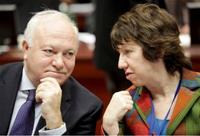 The European Parliament succeeded in winning valuable points in the battle for the future European External Action Service. High Representative of the EU for Foreign affairs and Security Policy Catherine Ashton in her turn won the hard battle with MEPs who had accepted her with skepticism and ruthlessly criticized her project for the diplomatic service. This first attempt of the Union, literally, to build a common foreign policy, showed all the “boulders” of integration - the internecine battles between Member States and European institutions on the one hand, the struggle for influence among Member States themselves, on the other and the competition among institutions, forced by the Lisbon Treaty, on the third hand.
The European Parliament succeeded in winning valuable points in the battle for the future European External Action Service. High Representative of the EU for Foreign affairs and Security Policy Catherine Ashton in her turn won the hard battle with MEPs who had accepted her with skepticism and ruthlessly criticized her project for the diplomatic service. This first attempt of the Union, literally, to build a common foreign policy, showed all the “boulders” of integration - the internecine battles between Member States and European institutions on the one hand, the struggle for influence among Member States themselves, on the other and the competition among institutions, forced by the Lisbon Treaty, on the third hand.
The exact parameters of the agreement reached on Monday between the European Parliament, the Council and the Commission are not clear yet. According to the official statement, the parties have reached “political agreement on the proposal for a Council Decision establishing the organisation and functioning of the European External Action Service. In addition to the Decision, parties reached agreement on the text of two Declarations by the High Representative: on political accountability and on the basic structure of the central administration.”
According to a draft political declaration, “The HR will respond positively to requests from the European Parliament for newly appointed Heads of Delegations to countries and organisations which the Parliament considers as strategically important to appear before AFET for an informal exchange of views before taking up their posts.” A request, that Baroness Ashton initially turned down but the deputies had apparently prevailed.
The meeting in Madrid was attended by HR Catherine Ashton; Miguel Ángel 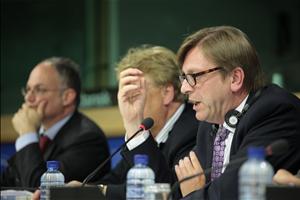 Moratinos, the foreign minister of Spain, who is currently holding the rotating presidency of the Council of Ministers; Maroš Šefčovič, the European Commissioner for inter-institutional relations and administration and a group of three MEPs: Elmar Brok, (EPP, Germany), Guy Verhofstadt (ALDE, Belgium) and Roberto Gualtieri (Italy, Group of the S&D).
Moratinos, the foreign minister of Spain, who is currently holding the rotating presidency of the Council of Ministers; Maroš Šefčovič, the European Commissioner for inter-institutional relations and administration and a group of three MEPs: Elmar Brok, (EPP, Germany), Guy Verhofstadt (ALDE, Belgium) and Roberto Gualtieri (Italy, Group of the S&D).
Officially no details were reported of the talks, nor on the parameters of the agreement. What is clear so far is that Parliament has earned the explicit formulation that only 40 percent of the staff to be temporary diplomats from Member States. The remaining 60% must be permanent staff to ensure the communitarian nature of the service - one of the main arguments of the MEPs against the initial Ashton's proposal. In addition, there will be no quotas for the countries despite the insistence of the new members. The EEAS will have more than 6 thousand employees and its own administrative budget, which will be subject to political control by the European Parliament - another important victory for the institution, which has argued that the Office should be politically accountable to MEPs.
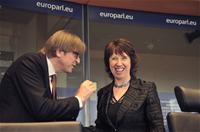 The strategic country planning will be realised by the Service but the final decisions remain a priority of the Commission. MEPs must be informed in advance about the strategic and policy decisions. The EEAS will be headed by a Secretary-General with two Deputies and also a Director General for Budget and Administration - the Parliament had insisted for the latter. According to EurActiv, as part of the deal Catherine Ashton has reserved the right to appoint the General Secretariat. The current French Ambassador to Washington Pierre Vimont is expected to be the so-called “primus inter pares” (first among equals) - an Executive Secretary General. The triumvirate will be completed by the Polish Minister for European Affairs Mikołaj Dowgielewicz and the German Helga Schmid.
The strategic country planning will be realised by the Service but the final decisions remain a priority of the Commission. MEPs must be informed in advance about the strategic and policy decisions. The EEAS will be headed by a Secretary-General with two Deputies and also a Director General for Budget and Administration - the Parliament had insisted for the latter. According to EurActiv, as part of the deal Catherine Ashton has reserved the right to appoint the General Secretariat. The current French Ambassador to Washington Pierre Vimont is expected to be the so-called “primus inter pares” (first among equals) - an Executive Secretary General. The triumvirate will be completed by the Polish Minister for European Affairs Mikołaj Dowgielewicz and the German Helga Schmid.
When absent, Ms Ashton will be substituted by the relevant European Commissioners (Štefan Füle - Enlargement, Andris Piebalgs - Development, and Kristalina Georgieva - Humanitarian aid) or by the foreign minister of the country holding the rotating EU presidency.
Elmar Brook MEP (EPP) commented, that the agreement didn’t bound the 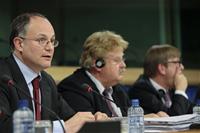 Parliament to the legislative procedure, but this was a good one. EurActiv quoted the leader of the ALDE Group Guy Verhofstadt, who was one of the most bitter opponents to the most part of the Service's model, presented by Ashton, who insisted that MEPs had succeeded to change “the initial philosophy” of Ashton’s earlier proposal, based in his words on the inert-governmental method. “We now have an ambitious, broader EEAS, with 6000-7000 diplomats and civil servants, based in the most appropriate way on the communitarian method, safeguarding, even strengthening the communitarian method on a number of issues”, he said.
Parliament to the legislative procedure, but this was a good one. EurActiv quoted the leader of the ALDE Group Guy Verhofstadt, who was one of the most bitter opponents to the most part of the Service's model, presented by Ashton, who insisted that MEPs had succeeded to change “the initial philosophy” of Ashton’s earlier proposal, based in his words on the inert-governmental method. “We now have an ambitious, broader EEAS, with 6000-7000 diplomats and civil servants, based in the most appropriate way on the communitarian method, safeguarding, even strengthening the communitarian method on a number of issues”, he said.
The Italian socialist Roberto Gualtieri said: "We also succeeded in ensuring that the European Commission maintains its responsibility over all financial instruments for external action. The S&D Group successfully defended the Community method and prevented member states from taking control over development cooperation and its budget".
According to the Group of the Greens/EFA, the agreement is a step in the right direction, but there is a lot to be done yet: "Much will now depend on whether Ms Ashton delivers on the often vague promises she made yesterday. If she finally demonstrates the leadership needed in the face of resistance from jealous national governments and a jealous Commission president, the new service will indeed be able to effectively integrate Commission and Council resources and make the
Union a champion of human rights, development and civilian crisis management. Otherwise, all we will have got is more bureaucracy with little added value for Europe's citizens and the Union's foreign
policy."
If MEPs succeed in voting the decision for the Service in early July, it is theoretically possible the first appointments to take place in October. Mr Brok said that the Parliament is expected to endorse his report on the Service in early July, but the changes to the Financial Regulation and the Staff Regulation would not be put to a vote before the summer break.
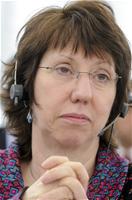 Ashton's ambition is the EEAS to be ready by December 1, for the first anniversary of the entry into force of the Lisbon Treaty. Thanks to it for the first time the Union got a permanent High Representative for Foreign Affairs and Security Policy - a post, obtained not without strong ironic comments and observations by Baroness Ashton. Under the same treaty, however, MEPs were given new powers and the first test was indeed the diplomatic service. Although the statement of Catherine Ashton herself, that through the EEAS Europe will speak with one voice, it currently sounds mostly like a chorus of discontented voices, seeking in the future Diplomatic Service leverage for national or institutional influence.
Ashton's ambition is the EEAS to be ready by December 1, for the first anniversary of the entry into force of the Lisbon Treaty. Thanks to it for the first time the Union got a permanent High Representative for Foreign Affairs and Security Policy - a post, obtained not without strong ironic comments and observations by Baroness Ashton. Under the same treaty, however, MEPs were given new powers and the first test was indeed the diplomatic service. Although the statement of Catherine Ashton herself, that through the EEAS Europe will speak with one voice, it currently sounds mostly like a chorus of discontented voices, seeking in the future Diplomatic Service leverage for national or institutional influence.
However, the compromise allows the work on the construction of the EEAS to go ahead. The only country which is not satisfied with the agreement is Belgium. EurActiv notes that the news was reported by Belgian media with regret that the Spanish presidency has managed to secure an agreement at the last moment, depriving the Belgium presidency of that merit. Belgium will take over the rotating Presidency.
 Federica Mogherini | © Council of the EU
Federica Mogherini | © Council of the EU | © Council of the EU
| © Council of the EU Luis De Guindos | © Council of the EU
Luis De Guindos | © Council of the EU